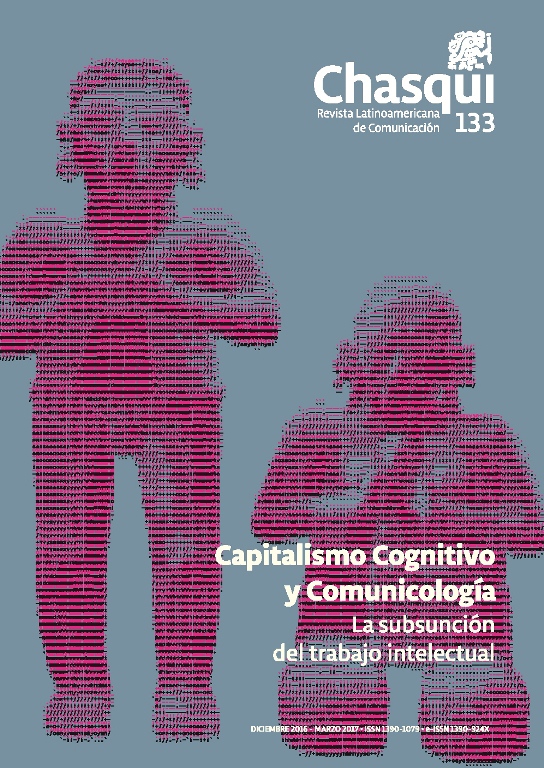The management university in Europe and the procedures for evaluation of the “quality” of teaching and research in Spain
DOI:
https://doi.org/10.16921/chasqui.v0i133.2922Keywords:
neoliberalism, cognitive capitalism, Bologna Process, academic excellence, EHEA, ENQA, ANECA, CNEAIAbstract
This article deals with the process of liquidation in which lives the public university in Europe and specifically addresses the case of Spain, establishing an emphasis on the teaching and research evaluation systems of its teaching staff. This group is the one being hardest hit by the systems and techniques of measurement with which the neoliberalism discipline and controls the public universities.References
Adam Smith Institute (1984). Omega Report. Education Policy. Londres: The Adam Smith Institute.
ANECA [Agencia Nacional de Evaluación de la Calidad y Acreditación] (2015). Criterios y directrices para el aseguramiento de Calidad en el Espacio Europeo de Educación Superior (ESG). Disponible en http://bit.ly/2ggZ49Y.
Bell, D, (1973). The coming of post-industrial society; a venture in social forecasting New York: Basic Books.
Bribosia, E.; D’Hainaut-Zveny, B. et al., (2014). Charte de la désexcellence. Disponible en http://bit.ly/2ggZflC.
Castells, M. (2000). La era de la información. Madrid: Alianza
Comisiones Obreras (2012). Comunicado de CC.OO. Informe sobre la Conferencia celebrada en Bucarest los días 26 y 27 de abril de 2012. Disponible en http://bit.ly/2g714Oy.
Corsani, A. & Lazzarato, M. (2002). Le revenu garanti comme processus constituant. Multitudes, nº 10.
CUPUMA [Coordinadora Universidades Públicas de Madrid] (2016). Objetivos y herramientas propuestos para implantar un nuevo modelo de universidad en el proyecto de ley de la CAM. Disponible en http://bit.ly/2gh0KAf.
Drucker, P. (1993). Post-Capitalist Society. New York: HarperCollins.
Escudero, J.M. & Trillo, F. (2015). Un análisis crítico del Espacio Europeo de Educación Superior como reforma de la enseñanza universitaria: los programas Verifica y Docentia en el contexto español. Educar em Revista, nº 57, pp. 81-97.
Fumagalli, A. (2007). Bioeconomia e capitalismo cognitivo. Roma: Carocci.
Fundación Conocimiento y Desarrollo (2015). Informe CyD 2015. La contribución de las universidades al desarrollo. Madrid: Fundación CyD
Galcerán, M. (2010). La mercantilización de la universidad. REIFOP, 13 (2), pp. 89-106.
Halffman, W, & Raddle, H. (2015). The Academic Manifesto: From an Occupied to a Public University. Minerva 53, pp. 165-187.
Hardt, M. & Negri, A. (2005). Imperio. Barcelona: Paidós.
Heatherly, C. (Ed.) (1980). Mandate for leadership: Policy management in a Conservative Administration. Washington, D.C: Heritage Foundation.
Herrán, A. (2012). Algunas Críticas a la Evaluación del Profesorado Universitario Centrada en el Impacto. En A. de la Herrán & J. Paredes (Coords.), Promover el cambio pedagógico en la universidad. Madrid: Pirámide.
Lazzarato, M. & Negri, A. (2001). Trabajo inmaterial. Formas de vida y producción de subjetividad. Rio de Janeiro: DP&A Editora.
Machlup (1962). The Production and Distribution of Knowledge in the United States. Princeton: Princeton University Press.
Masuda K. (1984). La sociedad informatizada como sociedad post-industrial. Madrid: Tecnos: Fundesco.
Montenegro, M. & Pujol, J. (2013). La fábrica de conocimientos: in/corporación del capitalismo cognitivo en el contexto universitario. Athenea Digital, 13(1), pp. 139-154.
Moulier-Boutang, Y., (2011). Cognitive Capitalism. Cambridge (MA): Polity Press.
Negroponte, J. (1995). El mundo digital. Barcelona: Ediciones B.
Nussbaum, M. (2015). Discurso de aceptación del doctorado Honoris causa en Antioquia, Disponible en http://bit.ly/1ZtYkww.
Oliván, C. (2016). Empleabilidad y Empleo: formación universitaria y mercado de trabajo en España y Aragón. Disponible en http://bit.ly/1xxexBZ.
Downloads
Published
Issue
Section
License
- Authors retain copyright and grant the journal right of first publication with the work simultaneously licensed under a Creative Commons Attribution-NoDerivs License (CC BY-ND) that allows others to share the work with an acknowledgement of the work's authorship and initial publication in this journal.
- Authors are able to enter into separate, additional contractual arrangements for the non-exclusive distribution of the journal's published version of the work (e.g., post it to an institutional repository or publish it in a book), with an acknowledgement of its initial publication in this journal.
- Authors are permitted and encouraged to post their work online.

